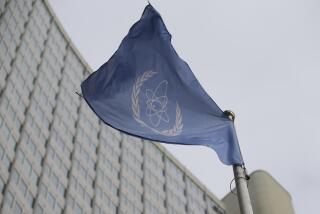Saudi Arabia Hikes Estimated Reserves of Oil, Gas Sharply : New Assessment Indicates Nation Has 50% More Crude
- Share via
Saudi Arabia, already blessed with the world’s largest reserves of crude oil, declared Monday that a new computer assessment shows it has about 50% more crude oil and 25% more natural gas than previously believed.
If correct, the new Saudi numbers would boost by about 10% the free world’s proven reserves of crude oil to the 900-billion-barrel range. This would tend to prolong the oil era and underscore the reliance of industrialized nations on the Middle East.
Some Saudi watchers said the dramatic upward revision is legitimate and overdue, while others said it was at least partly inspired by the politics of the Organization of Petroleum Exporting Countries. Both views might be correct, analysts said.
“This was a political announcement. On the other hand, they may well have the oil,” said William D. Dietzman, a retired Energy Department geologist who has studied the Saudi oil fields for the U.S. government.
Several other OPEC nations, including Iran, Iraq, Kuwait and Venezuela, have also increased their own oil reserve estimates sharply in the past year. The higher a country’s reserves, the greater its influence and production quota in OPEC. Within the oil community, Iran’s claims are widely discounted while the others are accepted to varying degrees.
The Saudis, through their Arabian American Oil Co., or Aramco, said that six years of studies at their new oil exploration and engineering computer center showed that they have 252.4 billion barrels of proven crude oil underground and 177.3 trillion cubic feet of gas.
U.S. Estimates Similar
For many years, the official Saudi government number was 110 billion barrels. But since at least 1975, the scientific community has carried Saudi Arabia on its books as having 150 billion to 170 billion barrels, the estimate varying annually with oil prices, discoveries and production levels.
The U.S. Geological Survey in Reston, Va., said its estimate a year ago was 167 billion barrels, similar to the Saudis’ own numbers at that time. The USGS put the natural gas estimate at 130 trillion cubic feet, while Aramco had previously estimated 141 trillion.
Dietzman and others said the timing of the announcement dramatically boosting the Saudis’ official oil reserve estimate strongly suggests that it was inspired by the need to hold their ground within OPEC for the purposes of determining quotas.
“They’re saying, if Iraq says it has 100 billion barrels, then we say we have 250 billion,” Dietzman said.
Even without the political element, any assessment of how much oil is underground and how much of it can be recovered with known technology and current prices is inexact. But in Saudi Arabia, the reserves are considered so large that it is hard to challenge any estimate.
Consultant Joseph Story of McLean, Va., a former Aramco executive, said there is so much oil in Saudi Arabia that until recently, not much effort has been expended at determining just how much there is.
But skyrocketing oil prices in the late 1970s and early 1980s prompted Saudi Arabia to spend some of the financial windfall on establishing a state-of-the-art oil exploration and engineering center in Dhahran in 1982 that is the envy of oil geologists.
Aramco, calling the latest estimates “very conservative,” said the work done at the Dhahran center is the basis for the big increase in the official reserve estimates.
“There was no need to look for oil. But now they’ve put a lot of money into upgrading their seismic capabilities and into exploration activity,” said Story, president of Gulf Consulting Services Inc. “The point of this is, the numbers are probably true. But in announcing it, they might also be trying to alleviate any worries that there are going to be shortages any time soon.”
The more plentiful the supplies of low-cost crude oil such as Saudi Arabia’s, the lower prices are likely to remain. However, the Middle East oil fields--which already account for about 70% of free world oil reserves--are expected to account for a steadily increasing share as other producing countries such as the United States run low.
Aramco, once a joint venture of the Saudi government and the U.S. oil giants Exxon, Mobil, Chevron and Texaco, operates Saudi Arabia’s oil fields. It is now 100% owned by the Saudis and its duties are to be supplanted by a new national oil company, Saudi Arabian Oil Co.
More to Read
Sign up for Essential California
The most important California stories and recommendations in your inbox every morning.
You may occasionally receive promotional content from the Los Angeles Times.













